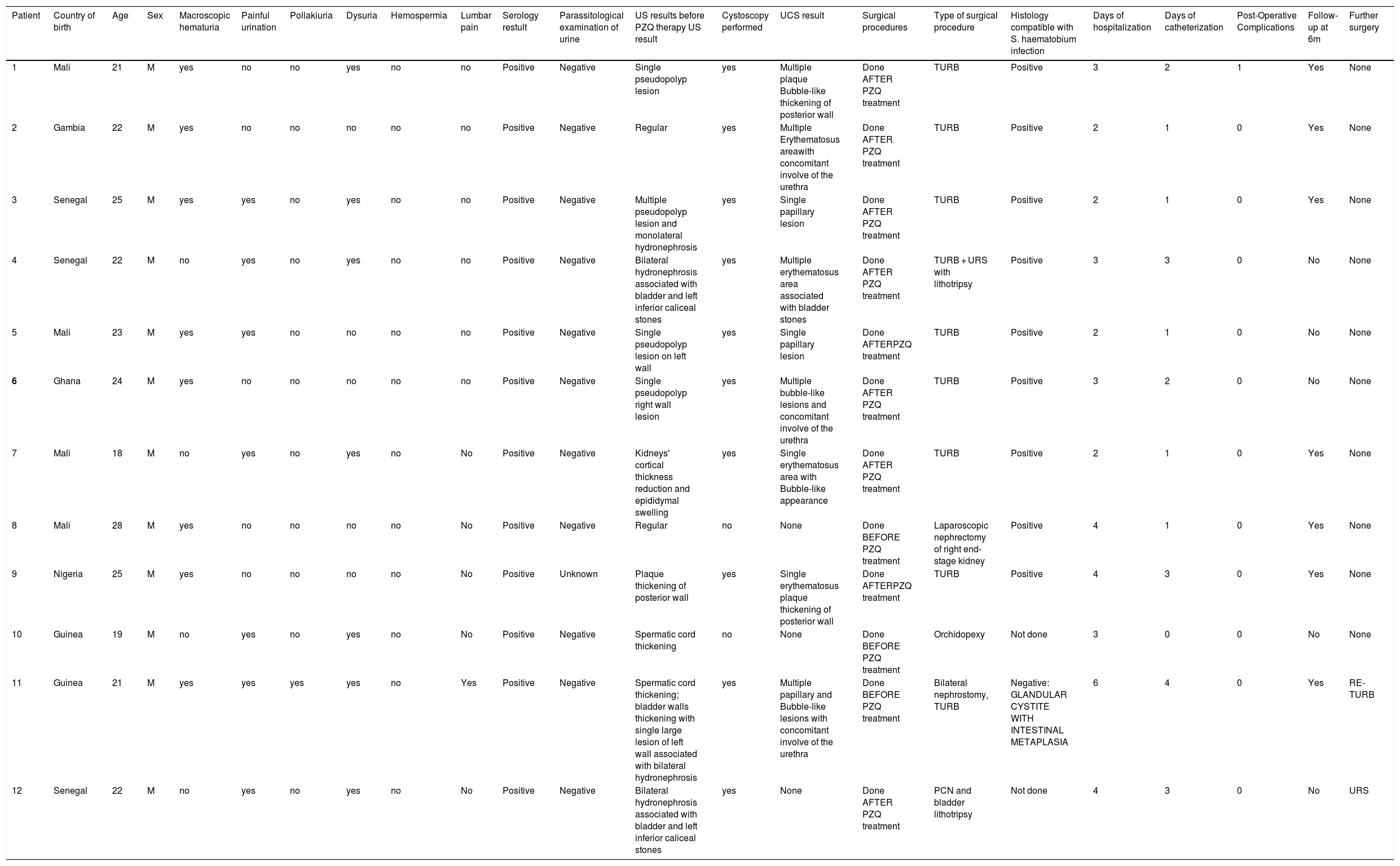An increasing number of urogenital schistosomiasis (UGS) is being diagnosed in Europe following the unprecedented migratory flux from Sub-Saharan Africa (SSA). This phenomenon represent a challenge for urologists working in a non-endemic area. The aim of this study is to describe the urological management and the surgical procedures of patients with UGS in a tertiary referral centre.
PatientsAll subjects from SAA diagnosed with UGS from January 2011 to November 2018 were enrolled retrospectively. Detailed data of patients with UGS undergoing to urological procedures were collected and analysed.
ResultsThirty patients were diagnosed with UGS, among them 12 (42.8%) were submitted to surgery. The most common surgical procedure was trans urethral resection of bladder (TURB) for suspected lesions persisted after praziquantel treatment performed in 7 cases (58%). Other surgical procedure were TURB and concomitant ureteroscopy with laser fragmentation for suspected bladder neoplasm with renal stone, endoscopic lithotripsy and percutaneous nephrolithotomy for bladder and renal stones, laparoscopic nephrectomy for end-stage kidney disease, placement of bilateral nephrostomy for hydroureteronephrosis, explorative testicular surgery for a suspected testicular torsion in one case each. Four patients (33%) were lost at the follow up.
ConclusionAn increasing number of migrants from SSA diagnosed with UGS has been observed. Some patients required a surgical intervention for suspected neoplastic lesions or end-stage organ damage. It was particularly difficult to perform a regular follow-up in several patients. Further multicentric studies are needed to reach a proper standard in diagnosis, treatment and follow-up of subjects with UGS.
Tras el flujo migratorio procedente del África Subsahariana (ASS) en Europa, el número de diagnósticos de esquistosomiasis urogenital (EUG) es cada vez mayor. Este fenómeno representa un desafío para los urólogos que trabajan en zonas no endémicas. El objetivo de este estudio es describir el tratamiento urológico y los procedimientos quirúrgicos de los pacientes con EUG en un centro de referencia terciario.
PacientesTodos los sujetos del ASS diagnosticados con EUG entre enero del 2011 y noviembre del 2018 fueron inscritos retrospectivamente. Se recogió y analizó la información detallada de los pacientes con EUG tratados mediante procedimientos urológicos.
ResultadosTreinta pacientes fueron diagnosticados con EUG, 12 (42,8%) fueron tratados mediante cirugía. El procedimiento quirúrgico más común fue la resección transuretral de vejiga (RTUV) para las lesiones sospechosas persistentes después del tratamiento con praziquantel administrado en 7 casos (58%). Otros procedimientos quirúrgicos (realizados una vez) fueron RTUV combinada con ureteroscopia láser por sospecha de neoplasia de vejiga con cálculos renales, litotricia endoscópica y nefrolitotomía percutánea para cálculos vesicales y renales, nefrectomía laparoscópica para enfermedad renal terminal, colocación de nefrostomía bilateral para hidroureteronefrosis, cirugía testicular exploratoria por sospecha de torsión testicular. Cuatro pacientes (33%) se perdieron en el seguimiento.
ConclusiónSe ha observado un número cada vez mayor de migrantes del ASS diagnosticados con EUG. Algunos pacientes requirieron intervención quirúrgica por sospecha de lesiones neoplásicas o daños en órganos en fase terminal. En varios pacientes fue particularmente difícil realizar un seguimiento regular. Se necesitan más estudios multicéntricos para lograr un manejo estándar en términos de diagnóstico, tratamiento y seguimiento de los sujetos con EUG.










